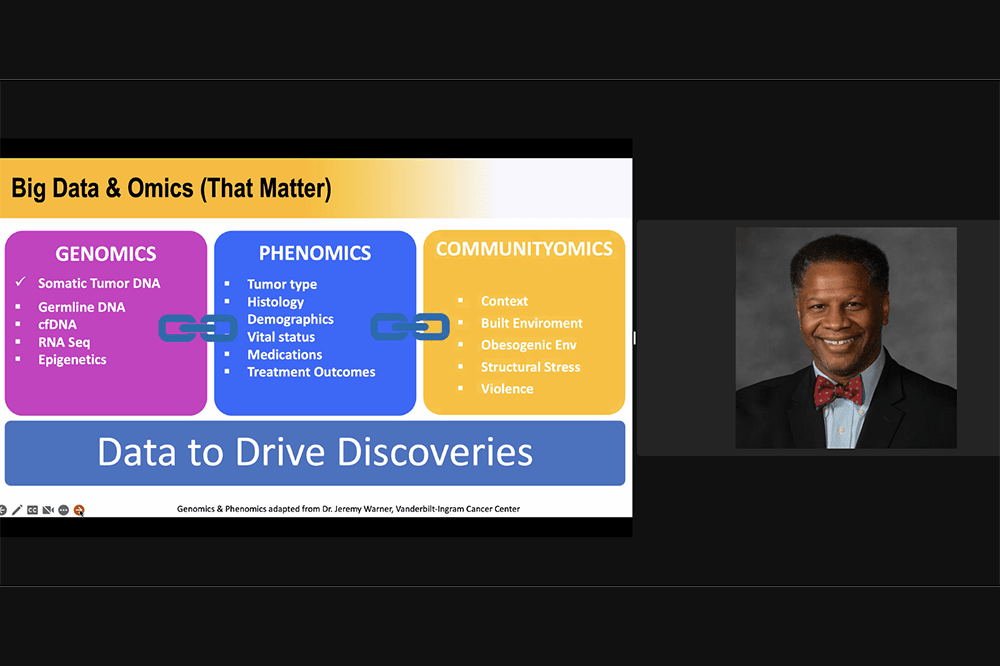[ad_1]
When it comes to health disparities, a more refined lens to look through is based on “place, space and ancestry,” argued Robert Winn, M.D.
Winn is the director of VCU Massey Cancer Center in Richmond, Virginia – the first Black leader of an NCI-designated cancer center – and was the keynote speaker at a recent virtual symposium that delved into cancer disparities.
The Cancer Health Equity Symposium hosted by SC CADRE – the South Carolina Cancer Disparities Research Center, a partnership between MUSC Hollings Cancer Centerand South Carolina State University (SCSU) – left participants ready to dive even deeper into work to eliminate differences in health outcomes among disparate groups of people.
“This has been a very powerful day,” said Marvella E. Ford, Ph.D., associate director for Population Science and Cancer Disparities at Hollings and co-leader of SC CADRE, noting that it is rare to have a discussion about basic science research, the social determinants of cancer health disparities and health care system critiques from community members in the same meeting. “We thank our scientists and advocates for this highly community-engaged symposium.”
It is not enough to simply talk about racial differences in cancer outcomes, Winn said. Instead, racial disparities are a result of the interaction between genetic differences and the social determinants of health. We cannot ignore how exposure to air pollution, poor access to nutritious food and more can affect how genes are expressed and, ultimately, cancer health outcomes, he said.
For example, prostate cancer is often cited as a cancer with great health disparities. Black men in South Carolina with prostate cancer are 2.5 times more likely to die than White men with prostate cancer. But a study of prostate cancer outcomes in men cared for in the Department of Veterans Affairs health system, where all veterans have equal access to care, found no differences in death rates between Black and White men – indicating that the underlying problem is not biological but systemic, Winn said.
Focusing on systemic problems also uncovers other disparities, he pointed out.
“If you have a 70-year-old White man living in Utah, versus a 70-year-old White man living in Kentucky, the man living in Kentucky has a 3 to 4 times higher rate of not only getting lung cancer but dying from it,” he said. “I want to move the discussion from just, ‘Blacks are just more predisposed to certain diseases because of my black skin and my biology’ – where some of that obviously is going to be true with our genetics – but let’s move it to the other ‘PSA.’ That is this conversation around place, space and ancestry.”
Winn’s talk capped off an afternoon of presentations that featured a range of basic science and social science data, and testimonials about personal experiences with cancer. All of the presentations focused on cancer disparities.
The goals of the SC CADRE are to develop high-impact cancer disparities research, to bring together researchers from MUSC, SCSU, and the community to collaborate and share ideas, and to train the next generation of cancer health equity researchers. In the past five years, SC CADRE members have published numerous peer-reviewed articles and obtained 33 grants.
SC CADRE is diversifying the cancer research workforce. Ford announced that the inaugural group of five SC CADRE undergraduate scholars graduated from the new SC CADRE Honors Program in Applied Oncology in 2021, and four have continued on in graduate programs. An additional 36 other SCSU students are participating in the honors program classes. A new cohort of 16 SC CADRE Scholars has started in the applied oncology research program in the fall of 2021, she said.
Additionally, the SC CADRE has recruited four early-stage investigators, established a biorepository at SCSU and hired the first biostatistician at SCSU.
One of the recruited Early Stage Investigators (ESI), Courtney Thomas, Ph.D., discussed her research into the plant Pseudognaphalium obtusifolium, known to the Gullah people of the Sea Islands as “life everlasting” and used as a natural remedy for sore throats, cold and flu and diarrhea. She’s looking into its effects on advanced glycation end products, or AGEs, that can lead to cancer and other health problems when they accumulate in the body.
John Luque, Ph.D., associate professor at Florida A&M University, described a research effort with community health centers to screen more Black men for colorectal cancer. Through this endeavor, 122 men were screened.
Well-known local dentist and patient advocate Larry Ferguson, D.M.D., shared his prostate cancer treatment journey. Ferguson is an ambassador for the Hollings Cancer Center SC AMEN program, which provides prostate cancer education and navigation to prostate cancer screening for black men in South Carolina.
Patient advocate Lee Moultrie led a lively discussion focusing on community members’ perspectives of the U.S. health care system in relation to cancer screening and treatment for populations of color and medically underserved groups.
Ford was pleased with the active sharing of ideas between the speakers and the audience, comprised of scientists, clinicians and community members. Hearing from the community helps researchers to focus their ideas and can give them new ideas – Thomas, for example, learned of the life everlasting plant from a student, and this plant has become a focus of her cancer research. Community feedback also reminds researchers to share their findings with the public.
The next SC CADRE Cancer Health Equity Research Symposium is planned for December 2022. Additional details are forthcoming.
[ad_2]
Source link


